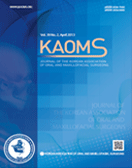Journal of the Korean Association of Oral and Maxillofacial Surgeons
- P-ISSN2234-7550
- E-ISSN2234-5930
- SCOPUS, KCI, ESCI
 ISSN : 2234-7550
ISSN : 2234-7550
Post-traumatic and postoperative neurosensory deficits of the inferior alveolar nerve in mandibular fracture: a prospective study
Hitesh Chander Mittal (BPS Government Medical College for Women)
Sunita Malik (BPS Government Medical College for Women)
Vikas Dhupar (Goa Dental College and Hospital)
Akash Sachdeva (Inderprastha Dental College & Hospital)
Vijaylaxmy Malhotra (SHK Government Medical College)
Gurdarshan Singh (BPS Government Medical College for Women)
Abstract
Objectives: We evaluated and recorded post-traumatic and postoperative neurosensory deficits of the inferior alveolar nerve (IAN) in mandibular fracture in order to identify associated risk factors.Materials and Methods: This was a prospective cohort study composed of 60 patients treated for mandibular fracture. The primary study variable was the change between the post-traumatic IAN neurosensory examination score and the score after fracture reduction. Risk factors were categorized as demographic, anatomic, fracture displacement, and treatment. Appropriate descriptive and bivariate statistics were computed.Results: Sixty patients with unilateral mandibular fracture reported within 24 hours of injury were evaluated over a one-year period. A post-traumatic neurosensory deficit was observed in 52 patients (86.7%), the percentage of which was reduced to 23.3% over the follow-up period. Abnormal post-operative neurosensory scores were significantly higher in angle fracture cases (33.3%) compared to body fracture cases (11.1%). When recovered and non-recovered neurosensory scores were compared by fracture location, 88.9% of body fracture cases showed significant recovery compared to 66.7% of mandibular angle fracture cases. Cases with less than 5 mm fracture displacement showed statistically significantly higher neurosensory recovery scores (90.6%) compared to those with more than 5 mm fracture displacement (60.7%).Conclusion: Use of a miniplate with mono-cortical screws does not play a role in increasing IAN post-traumatic neurosensory deficit. Early manage-ment can reduce the chances of permanent neurosensory deficit. Mandibular fracture displacement of 5 mm or more and fracture location were found to be associated with an increased risk of post-traumatic IAN neurosensory score worsening.
- keywords
- Mandibular nerve, Nerve injury, Mandibular fractures
- 37Downloaded
- 147Viewed
- 0KCI Citations
- 0WOS Citations